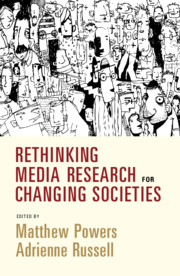Book contents
- Rethinking Media Research for Changing Societies
- Communication, Society and Politics
- Rethinking Media Research for Changing Societies
- Copyright page
- Contents
- Figure
- Contributors
- Acknowledgments
- 1 Introduction
- Part I Living in a Datafied World
- Part II Journalism in Times of Change
- Part III Media and Problems of Inclusion
- 7 Journalism and Inclusion
- 8 Afrotechtopolis
- 9 Exploiting Subalternity in the Name of Counter-Hegemonic Communication
- Part IV Engagement with and through Media
- Part V The Role of Scholars
- Other Books in the Series (continued from page ii)
- References
9 - Exploiting Subalternity in the Name of Counter-Hegemonic Communication
Turkey’s Global Media Outreach Initiatives
from Part III - Media and Problems of Inclusion
Published online by Cambridge University Press: 18 September 2020
- Rethinking Media Research for Changing Societies
- Communication, Society and Politics
- Rethinking Media Research for Changing Societies
- Copyright page
- Contents
- Figure
- Contributors
- Acknowledgments
- 1 Introduction
- Part I Living in a Datafied World
- Part II Journalism in Times of Change
- Part III Media and Problems of Inclusion
- 7 Journalism and Inclusion
- 8 Afrotechtopolis
- 9 Exploiting Subalternity in the Name of Counter-Hegemonic Communication
- Part IV Engagement with and through Media
- Part V The Role of Scholars
- Other Books in the Series (continued from page ii)
- References
Summary
This chapter asks how scholars should grapple with communication initiatives that advocate for inclusion on some issues while remaining anti-democratic and highly exclusionary in other key respects. Taking the case of Turkey’s governing party, Bilge Yesil explores a wide-ranging media ecology – a state-financed public broadcaster and news agency, government aligned English language dailies, NGO digital efforts – that purport to speak on behalf of subaltern groups (Muslim refugees, African Americans, Palestinians) in the global public sphere. She argues that such efforts cannot be read as simply anti-hegemonic; rather, they must be understood as instrumental uses of “subaltern” discourses. Yesil’s analysis demonstrates why scholarship examining authoritarian and populist communication need to look beyond simply the ways such actors speak and polarize publics, and instead grasp how these efforts aim to legitimate themselves while neutralizing their critics. In doing so, she calls attention to the way inclusion-exclusion dynamics are not merely single-nation stories, but rather are constructed in part through transnational relations among nation-states.
Keywords
- Type
- Chapter
- Information
- Rethinking Media Research for Changing Societies , pp. 119 - 136Publisher: Cambridge University PressPrint publication year: 2020
References
- 1
- Cited by

